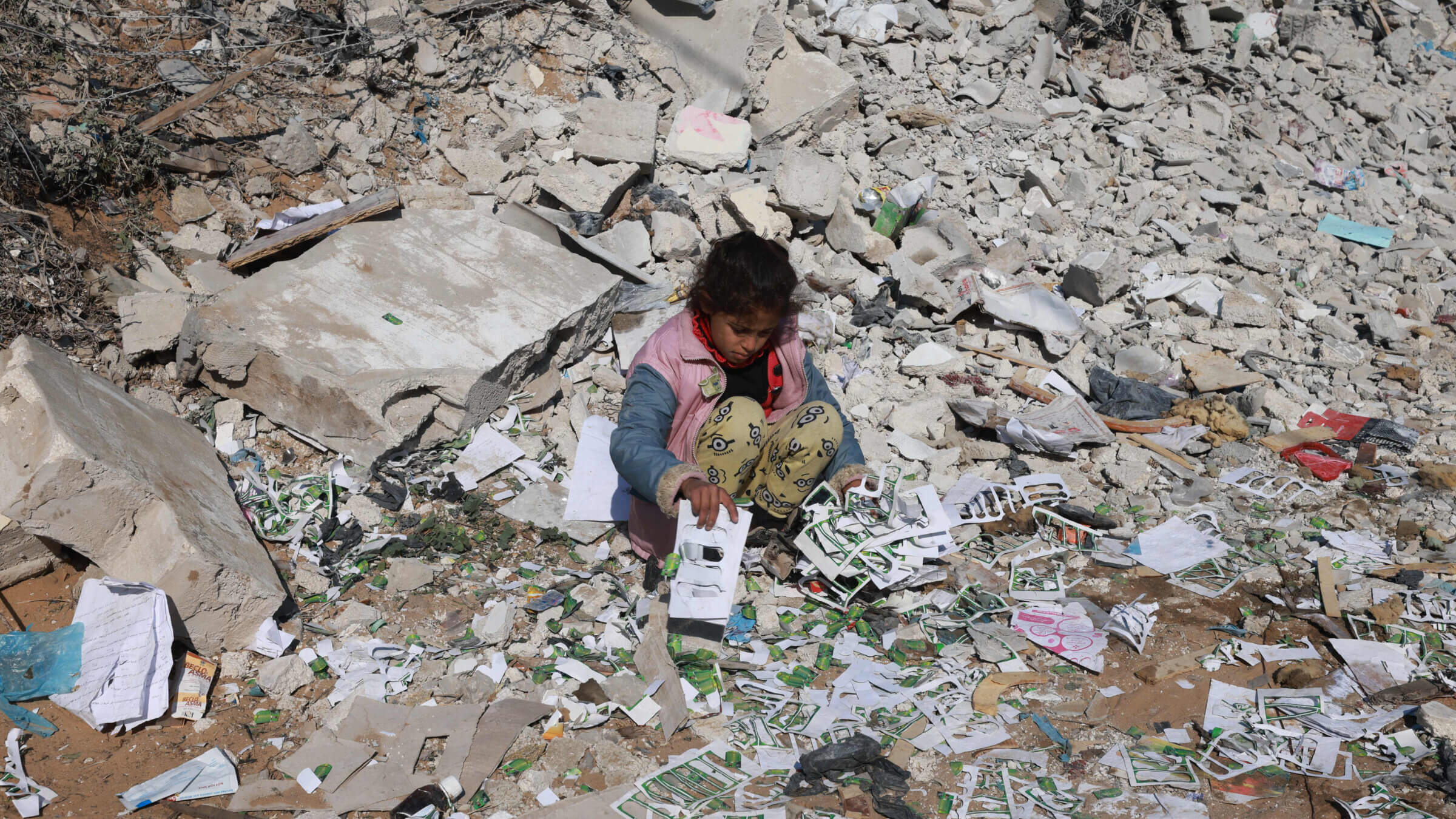Why I couldn’t pray this Yom Kippur
Repenting for individual sins seemed too small in the face of the wars in Gaza and Lebanon

A Palestinian girl looks for salvageable items amid the destruction on the southern outskirts of Khan Yunis in Gaza on Jan. 16. Photo by MOHAMMED ABED/AFP via Getty Images
A colleague recently reminded me that during the Vietnam War, Rabbi Abraham Joshua Heschel told a journalist that he could not pray because whenever he opened a prayer book, he saw images of children burning from napalm.
I don’t compare my own prayer practice to that of Rabbi Heschel, but I had a similar experience this Yom Kippur. Wherever I looked in the liturgy, I found myself wondering how many Gaza residents or Lebanese or Palestinians in the occupied West Bank the Israel Defense Forces had killed that day while we were all in synagogue.
Many of the lines of the Al Het, where we list our communal sins, applied directly to things the Israeli military has done during this war — things far beyond what was needed to defend ourselves from attack. For the sins we committed by “hardening our hearts,” “resorting to violence,” “through arrogance,” “through condescension,” “through ego” — it could have been describing what has transpired these past months in Gaza and, now, Lebanon.
The several places where the High Holiday prayer book calls on us to pray for the needs of the whole world reminded me of how many Israeli and diaspora Jews seem unable to recognize the pain and destruction we have caused to others this year. With the war and its horrors continuing to increase, praying about my own soul development seemed too small.
Yom Kippur is my favorite holiday. I love the deep inner work of Elul, the month of reflection that leads up to Rosh Hashanah, and the 10 days of awe that culminate in the fast of atonement. I love the sense that individuals throughout our communities are all diving deep inside to discern where they have caused hurt in the year gone by, and how they want to do better in the coming year. I love the sense of cleansing and joyful possibility I almost always emerge with at the end.
But this year, I could only think about the complicity of American Jewish leaders supporting Israel’s government in prosecuting this war. Should we have called attention to the demonstrated reality that Prime Minister Benjamin Netanyahu is prioritizing his own political survival over the needs of the 101 hostages still in Gaza? Should we have publicly expressed horror at attacks on refugee camps, hospitals and schools?
There is a personal question of teshuvah — repentance — here as well. Could I myself have done more? Should I have used my own voice more boldly to say: “No, this is not how a Jewish state should conduct a war, even one initiated by a heinous attack?”
And I wondered whether the Jews around me were doing teshuvah for the way we have allowed our hearts to harden during this terrible year. Already a deeply traumatized people, we have come to feel that there are enemies everywhere. Even if we aren’t the ones fighting on the ground, we imagine that we need to keep up an internal armor of hate, anger and dehumanization of the other side.
I would never tell anyone directly affected by the violence that they should handle their feelings differently. To those who lost loved ones on Oct. 7 or since, those who are anguished about the fate of their loved ones in captivity, I offer only my prayers and my deepest love. I understand that for them, getting up each morning is a Herculean task.
But those of us not in that inner circle of mourners should by now, especially in this sacred season of repentance, be asking ourselves what has happened to our hearts this year. Why do we encourage one another to repeat hateful narratives about the Palestinian “other,” as if all Palestinians attacked us on Oct. 7, as if all Palestinians are evil and we are all good?
It’s true that we were victimized. But so were tens of thousands of slain innocent Palestinians and many more displaced and deprived of the basic needs of life in Gaza. And so are countless Lebanese now displaced from their homes as we fight to allow residents of northern Israel to return to their homes. And so are the West Bank Palestinians, subjected to regular threats and violence by settlers and the soldiers who protect them.
We, the Jewish people, are not the only victims in this terrible war. We have been oppressed, but we have also grievously oppressed others.
I was tormented by these thoughts throughout Yom Kippur, trying and failing to push them away. I wanted this Yom Kippur to be like every other Yom Kippur. But it was profoundly different.
And then it shifted. I am blessed to lead my Palo Alto synagogue in Ne’ilah, the powerful closing service of the day. Each year as the sun sets, I stand facing the open ark, my back to the congregation, whose voices swell in song. I felt their prayers for peace and did my best to raise them up to God.
May these passionate prayers – my own and those of all Jews and human beings everywhere – be heard in this new year.
















